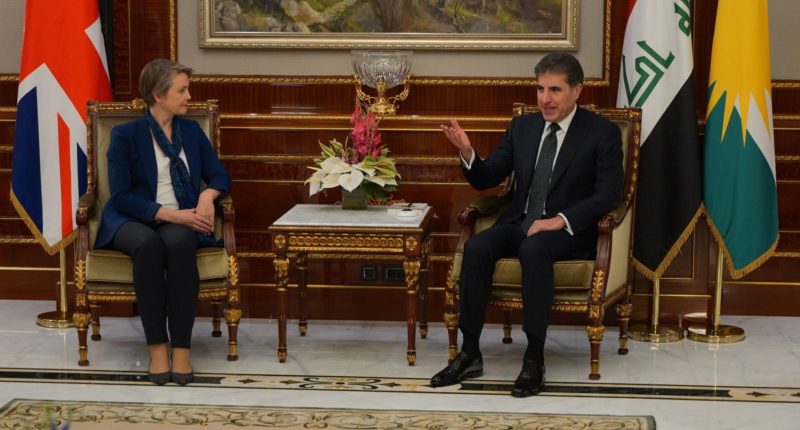Britain and Iraq have agreed an unprecedented joint plan to tackle people smuggling gangs responsible for thousands of migrants crossing the Channel in small boats.
On a three-day visit to the country, the Home Secretary Yvette Cooper also signed a new agreement to ensure failed Iraqi asylum seekers are returned home more “swiftly”.
She met ministers from the federal government in Baghdad and regional leaders in Kurdistan in the north where many smuggling gangs are based.
The agreement will involve greater intelligence sharing and more joint law enforcement operations, all designed to increase the number of smugglers that are prosecuted.
As part of the deal, the UK will give Iraqi law enforcement £300,000 for training in border security, focused on organised immigration crime and drug trafficking. On top of this, the authorities in the Kurdistan Region of Iraq will get support worth £200,000 to help tighten their border security and tackle irregular migration.
The Home Secretary was accompanied by Martin Hewitt, the government’s new Border Security Commander, who met his Iraqi counterpart. Both men will play a huge role in trying to make the agreement work.
The BBC team were the only broadcast journalists travelling with Cooper. The focus in Baghdad was a half-day meeting with her Iraqi counterpart, Abdul Amir al-Shammari.
They met at the interior ministry before visiting the Iraqi human trafficking centre.
The home secretary also toured a police college where she was guest of honour for a marching parade of more than 2,000 newly trained Iraqi officers.
The agreement is the first substantive attempt by the government to fulfil the prime minister’s “personal mission” to combat people smuggling at source rather than just trying to stop boats in the Channel.
Iraqi migrants are regularly among the top five nationalities seeking to cross to the UK and many of the smuggling networks across Europe are run by Iraqi Kurds. We spoke to Shukria Badar, a mother of five boys and two girls from Erbil, whose son Baryar Mohamed used people smugglers to try to reach Britain.
He perished in the Channel when his overloaded boat sank in heavy seas. He was 23-years-old. Shukria wept as she told us how she fears one of her other sons may one day also try to reach Britain using people smugglers.
“I wish they would die all these smugglers. They deserve to die for every tear l’ve shed for my son, for every tear other mothers have shed for their children. “I pray that God punishes them for what they have done, and there must be a law to put these smugglers in prison.”
The new UK-Iraqi deal is designed to be a blueprint for further cooperation between both governments.
It will involve a new communications campaign to try to counter smuggler propaganda on social media. The aim will be to deter Iraqis coming to the UK by telling real stories about “the risks and realities of travelling to the UK irregularly”.
A new taskforce of experts from both countries will be set up to agree ways of upgrading Iraq’s biometric border controls. This would help identify migrants without documentation.
The two governments also agreed to “enhance their cooperation” to ensure failed Iraqi asylum seekers in the UK are returned home “swiftly” by cutting red tape and improving technology.
But the home secretary refused to say how many Iraqis would be returned and how quickly.
She said: “We think this partnership is really important because it includes training, capability building, information sharing in order to go after these criminal gangs who are profiting from undermining border security, profiting from putting lives at risk.
“They’ve been operating out of the Kurdish region in Iraq and having that law enforcement cooperation across borders is crucial to going after gangs who operate across borders as well.”
Diplomats accept there are many questions about this policy.
There is a risk that smuggling networks are replaced the moment some ringleaders are arrested.
There may be difficulties getting different parts of Iraq’s law enforcement agencies to cooperate with one another.
Communications campaigns to deter migration often struggle to counter the reports of friends and family in the UK.
We spoke to one people smuggler in Erbil who wished to remain anonymous. He told us the new agreement might make him more cautious for a while but it would not stop him doing business.
The man – who was 36-years-old and from northern Iraq – said he had helped more than 5,000 people leave Kurdistan. He said he was responsible for organising the whole journey to the UK. But he refused to take responsibility for migrants dying in the Channel, blaming local smugglers for overloading boats and migrants themselves for taking the risk.
“We often pay for the boat that carries small numbers, because we bear responsibility for it. The parents are also informed that the road is illegal,” he said.
“In the event of deaths or harm, we do not bear responsibility. The majority of these incidents occur because Pakistani and Afghan smugglers load large numbers onto boats.
“The majority of drowning accidents are for those who pay less amount of money. A boat that carries a few people has a higher price than a boat that carries a large number of people. For example, for a boat that is heavily loaded, we pay 1,200 euros but for a boat that carries a smaller number, we pay 2,500 euros.”
Iraq’s interior minister, Abdul Amir al-Shammari, insisted the new agreement would help tackle this. “The cooperation will involve comprehensive training, exchange of expertise and intelligence coordination in tracking wanted individuals,” he told the BBC.
“The United Kingdom is a significant country for Iraq and a key partner. We hope this cooperation will serve as a starting point for broader collaboration across all ministries.”
Source:bbc.com





